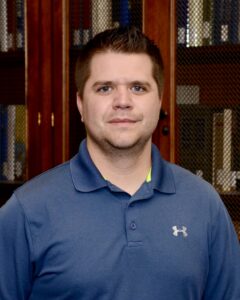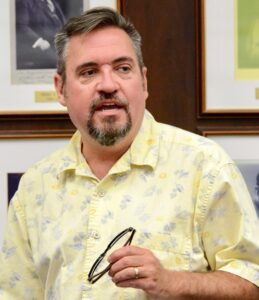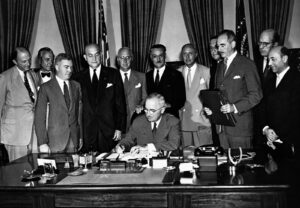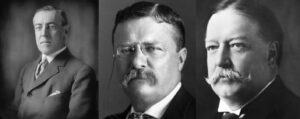
Cody Stafford Teaches the Progressive Challenge to the Founding
Through the MAHG program, Cody Stafford learned how to help students gain a deep understanding of key historical concepts, even during a fast-paced APUSH course.

Choosing What to Teach
American history is rich and detailed, but time in the classroom is limited. Even if one covered it all, simply “covering content doesn’t really help students learn anything,” says Cody Stafford, a history teacher at Unionville High School in Pennsylvania. Deciding what to emphasize, Stafford asks, “Which topics will most help students understand why Americans think the way we do, why our government does things the way it does, and why it’s structured as it is? For me, the Founding period and the Progressive era are the two ideological giants in the room that students really need to understand.”
Unionville, in a western suburb of Philadelphia, ranks highly on measures of school effectiveness. Stafford’s courses are challenging. In his AP US history class, he uses primary documents daily and spends several weeks teaching the writing skills students need to perform well on the AP exam. He gives particular attention to the Founders’ effort to shape a limited republican government and the Progressive effort to expand government’s role.
“We spend a lot of time looking at the Declaration, the Constitution and key Federalist papers, as well as a couple of Anti-Federalist papers, which we read all the way through.” This helps students grasp the understanding of government that informs American history through the Civil War. Later, Stafford’s students read progressive political theory—such as the essays of Woodrow Wilson—which helps them understand the entire 20th century. “If you understand the Progressive Era, you understand FDR and the New Deal, and you understand LBJ and the Great Society. You understand how these American leaders saw the role of government.”
How the Progressives Understood Government
As an undergraduate, Stafford concentrated in European history. “I had never taken a course in American history that went past the Civil War. I knew nothing about the Progressive Era—until I came to Ashland,” to study in the Master of American History and Government program (MAHG). “Taking the Progressive Era course really changed the way that I think about US history.”
Stafford had taught the Progressive Era as a reform movement arising in response to the unregulated business growth that followed the Civil War. It fit into a pattern of alternating laissez-faire and reformist tendencies in American politics. In MAHG, however, he came to see that the progressives introduced a completely new understanding of the role of government.
“The founders saw government itself as the only threat to citizens’ natural rights. The progressives saw a new threat in business corporations.” Their economic might, and their status as individual persons under the law, gave them power over workers’ lives. “The only institution that could control big business was government. So they wanted to give government power to regulate those businesses.”
The progressives also felt “an overwhelming zeal for democracy” that reshaped American politics in the 20th century. Changes in electoral practices that made government more immediately responsive to the popular will would, they felt, restrain government from using its new powers unfairly. “But to the founders, ‘democracy’ was not necessarily a good thing. They created a republic, believing that the people making decisions needed to be in a position to make those decisions”—equipped with education, political experience and a reputation for wise decision-making.
Progressives reforms, such as the introduction of referenda and the 17th Amendment’s revision of the system for electing senators, eventuated in our current system of primary elections. This has encouraged the election of political newcomers, mavericks, and extremists.
“After the McGovern-Fraser Commission, if you’re a moderate, you’re out of luck—you’re not going to be running on your party’s ticket. The polarization we see today is a direct result of the primary system,” Stafford says. “I don’t know the answer to that. Do you tell people they don’t get to vote in primaries? Do you go back to the system where party bosses pick the candidates? Once you give democracy to people, you can’t take it back.”
Students Recreate the 1912 Election

Along with a clearer grasp of this discontinuity in Americans’ understanding of government’s role, Stafford also gained a new teaching approach from MAHG. During a course on US history after World War II taught by Professor John Moser, Stafford played a history game called Reacting to the Past (RTTP). In these games, students assume the roles, motives and opinions of key players in a pivotal moment of history. They recreate the event in a structured but open-ended way, sometimes leading to surprising outcomes. Moser’s post-war history course involved two RTTP games—one on the Yalta Conference and the other on the 1968 Democratic Party Convention.
The typical MAHG seminar involves “heavy discussion of three hundred pages of primary documents, which I enjoy,” Stafford said. But after a couple of weeks, “you can get a little burned out.” He took Moser’s class expecting a less intense experience. Instead, he found himself deeply engaged, playing the role of Winston Churchill at Yalta. He combed through the reading packet to master the positions of the other players as well as the positions and rhetoric of Churchill. He met with players on his team to devise a strategy that would divide the post-war world on terms favorable to Britain. “It was an all-encompassing experience, and I loved it. I knew I wanted to use something like that in my classes.”
The right moment to introduce a RTTP game came during the pandemic year of 2020 – 2021, when, after weeks of Zoom classes, Stafford’s students were weary “of watching me on a screen talking at them. I knew that Professor Moser had recently written a game, Progressivism at High Tide: the Election of 1912. So I reached out to him and he most graciously sent me all the materials.” Reviewing them, Stafford found they covered almost every element of the APUSH curriculum pertaining to industrialization and the Progressive response. Stafford’s students played the game and “absolutely loved it.” He worried students might not retain the lessons the game taught—until summer brought him his students’ AP scores. They scored higher on the Progressives than on any other content area on the exam.
How Historical Role-Playing Promotes Learning
This year, Stafford has used two RTTP games: one on the Constitutional Convention; and, again, the game on the 1912 election.
To win each game, a team has to achieve a more favorable outcome than historically occurred. Wilson’s 1912 electoral victory was so sweeping that a team winning the game need not “win” the election, but only win significantly more votes than their party did historically. Students play so competitively that the game’s outcome can be surprising. “Woodrow Wilson’s team did not win in a single one of my classes this year,” Stafford said.
Students who play RTTP games gain “a very rich, deep historical understanding” of an era by exercising key learning skills, Stafford thinks. “They have to read and interpret primary sources, use them in the speeches they’re giving, and make their speeches persuasive. If you’re trying to persuade somebody to do something, you need to not only understand your own position; you need to know your opponents’ arguments also, so you can anticipate and counter them. The amount of work students put into this is incredible. They don’t even really see it as work—which is the way it should be when you’re learning,” Stafford said.
Historical role-playing allows students to learn in way that seems “natural to how we live,” debating issues as they happen in a fictive “real time” instead of analyzing the ideas and motives of historical third parties. Role-playing also frees students of self-consciousness. They can make a questionable point, if it’s “what they really think their character would have said, without it reflecting personally on them. Students I haven’t heard more than a few words from all year will stand at a podium, giving passionate speeches. It really is a transformative experience.”
Overall, Stafford says, “MAHG was honestly the best professional experience of my life. Through summers in Ashland, I made lifelong friends with teachers who share my passion for US History and government.” During the ‘distanced learning’ period of the pandemic, Stafford’s MAHG friends helped him keep his students focused. “A MAHG friend and I met over Zoom and made AP exam review videos together that I still post for my kids today.”
John Moser’s game Progressivism at High Tide: the Election of 1912, will be featured at one of our MAHG courses this summer: The Progressive Era, July 17-24. Several seats are still available. Please go to our Summer 2022 information page to learn more.
For more materials on the election of 1912, see our newly-released exhibit “The Presidential Election of 1912“.



